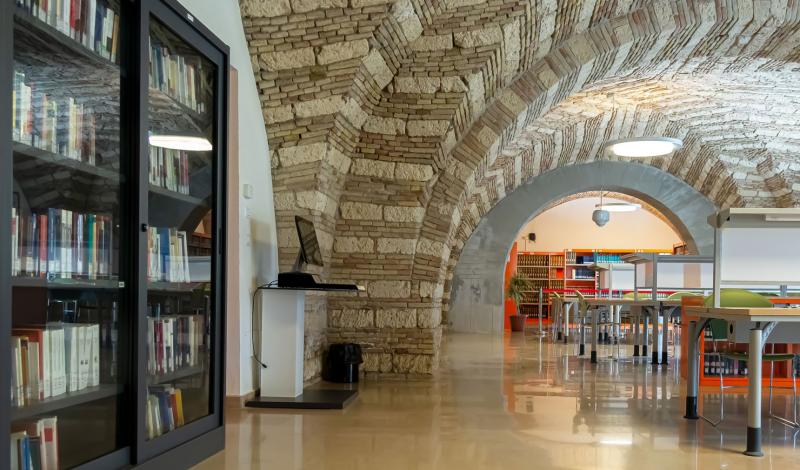
Professors from Italian Universities
- Andreassi Mario, Università di Bari
- Berardi Caterina Celeste, Università di Foggia
- Bianchi Nunzio, Università di Bari
- Caroli Menico, Università di Foggia
- Catone Antonella, Università di Foggia
- Conte Floriana, Università di Foggia
- Cotugno Annamaria, Università di Foggia
- D'orsi Lorenzo, Università di Foggia
- Daniele Antonio Rosario, Università di Foggia
- Di Cesare Riccardo, Università di Foggia
- Dimundo Rosa Alba, Università di Bari
- Drago Anna, Università di Bari
- Eramo Immacolata, Università di Bari
- Favia Pasquale, Università di Foggia
- Giannantonio Valeria, Università di Chieti-Pescara
- Giuliani Roberta, Università di Bari
- Goffredo Roberto, Università di Foggia
- Ingravallo Tiziana, Università di Foggia
- Ingrosso Paola, Università di Bari
- Lagioia Alessandro, Università di Bari
- Leone Danilo, Università di Foggia
- Lomiento Vincenzo, Università di Foggia
- Marchi Maria Luisa, Università di Foggia
- Masselli Grazia Maria, Università di Foggia
- Minervini Francesco Saverio, Università di Foggia
- Montecalvo Maria Stefania, Università di Foggia
- Otranto Rosa, Università di Bari
- Palmieri Rossella, Università di Foggia
- Palumbo Gianni Antonio, Università di Foggia
- Pellegrino Matteo, Università di Foggia
- Perrone Capano Lucia, Università di Foggia
- Picciaredda Stefano, Università di Foggia
- Pinto Pasquale Massimo, Università di Bari
- Ragno Tiziana, Università di Foggia
- Riccio Anna, Università di Foggia
- Russo Michele, Università di Foggia
- Russo Saverio, Università di Foggia
- Santelia Stefania, Università di Bari
- Schiano Claudio, Università di Bari
- Scionti Francesca, Università di Foggia
- Sivo Francesca, Università di Foggia
- Solaro Giuseppe, Università di Foggia
- Tedeschi Antonella, Università di Foggia
- Totaro Pietro, Università di Bari
- Turchiano Maria, Università di Foggia
- Tuzzo Sabina, Università di Salento
- Valerio Sebastiano, Università di Foggia
Professors from foreign Universities
- Abbrugiati Perle, Università di Aix-Marseille
- Arriaga Florez Mercedes, Università Di Siviglia
- Benetos Dionysios, The National & Kapodistrian University of Athens
- Cristóbal López Vicente, Universidad Compluten Madrid
- Di Nunzio Novella, Università di Vilnius
- Duplouy Alain, Università Paris 1 Panthéon-Sorbonne
- Hurch Bernhard, Universität Graz
- Krumeich Ralf, Universität Bonn
- Lazzarin Stefano, Università di Saint- Ètienne
- Martin Clavijo Milagro, Università Di Salamanca
- Michalopoulos Andreas N, The National & Kapodistrian University of Athens
- Papaioannou Sophia, The National & Kapodistrian University of Athens
- Quirós Castillo Juan Antonio, University of the Basque Country
- Radulescu Raluca, Università di Bucarest
- Rella Angelo, Università di Stettino
- Vial Hélène, Université Clermont Auvergne
- Vroom Joanita, Università di Leiden
- Zelic Tomislav, Università di Zara
- Öhlschläger Claudia, Universität Paderborn
- Dibenedetto Grazia
Chrono-typological and archaeometric study for understanding glass production in central Apulia between the 8th and 14th centuries AD.
Supervisor: Roberta Giuliani. - Foglia Flavia
Apulian heritage, world heritage: a local and global history.
Supervisor: Stefano Picciaredda. - Malagrinò Mustica Anita
The school of Isocrates: philological and historical study.
Supervisor: Massimo Pinto.
Co-tutors: Prof. Didier Marcotte, Prof. Pierre Pontier (Sorbonne Université) - Notarangelo Michele
Leonardo Sciascia and his correspondences of the “Leonardo Sciascia Documentation Center – 20th Century Archive” of San Marco in Lamis.
Supervisor: Antonio Rosario Daniele. - Ostuni Alice
Themes and topoi of elegy in medieval poetic production.
Supervisor: Alessandro Lagioia. - Pasculli Giuseppe
The doctrine of the “Status Causae” in Elio Donato’s “Commentum Terentii”.
Supervisor: Antonella Tedeschi. - Savino Grazia
Living in the Gargano: the evolution of settlement systems on the Gargano promontory from prehistory to the Middle Ages.
Supervisor: Maria Luisa Marchi. - Tomaciello Maria
Forms of reception and rewriting of Virgil in Giovanni Pascoli.
Supervisor: Sebastiano Valerio.
- Composition
- Prof. Lucia Perrone Capano (PhD Program Coordinator)
- Prof. Menico Caroli
- Prof. Antonella Catone
- Prof. Riccardo Di Cesare
- Dr. Angelo Valentino Romano (Technical-Administrative Staff)
- Dr. Giuseppe Pasculli (PhD Student Representative)
Composition
- prof.ssa Tatiana Crivelli Speciale, Direttrice dell’Istituto di Romanistica dell’Università di Zurigo;
- prof. em. Bernhard Hurch, Institut für Sprachwissenschaft, Università di Graz;
- dott.ssa Antonia Magnacca, Responsabile Segreteria di direzione, Pomilio Blumm S.r.l., Agenzia di comunicazione integrata per la Commissione Europea;
- prof. Emanuele Papi (Università di Siena/Accademia dei Lincei), Direttore della Scuola Archeologica Italiana di Atene;
- dott.ssa Antonella Pautasso - Dirigente di Ricerca del Centro Nazionale delle Ricerche - Istituto di Scienze del Patrimonio Culturale di Catania;
- dott. Yuntao Wang, impresa cinese Beijing Zhongyikun Technology Training Co. Ltd.
In light of the international debate on the role of universities in the field of knowledge and their relationship with local communities, as well as ANVUR’s guidelines on enhancing interactions between universities and society—referred to as the University’s Public Engagement—the PhD program in Humanities aims to promote activities directed towards society and the territory.
Recognizing that disseminating research results is a core objective of the activities related to Public Engagement, the PhD in Humanities seeks to foster dialogue not only with the national and international academic community, but also with society and local communities. This is achieved through the organization of seminars, conferences, and events involving faculty members and students, both within the Department and in collaboration with other institutions (public and private entities, associations, schools, research centers, etc.).
To this end, doctoral candidates are encouraged throughout their program to participate in—and/or organize—events that position them as active contributors to the dissemination of research beyond academic circles.
Public Engagement Activities of the Department of Humanities
Browse the section
Program Structure
- Coordinator:
Prof. Lucia Perrone Capano - Affiliated Department:
Department of Humanities – Literature, Cultural Assets, Education Sciences - Program ID Code:
DR 1288-2022
Contact Email:

